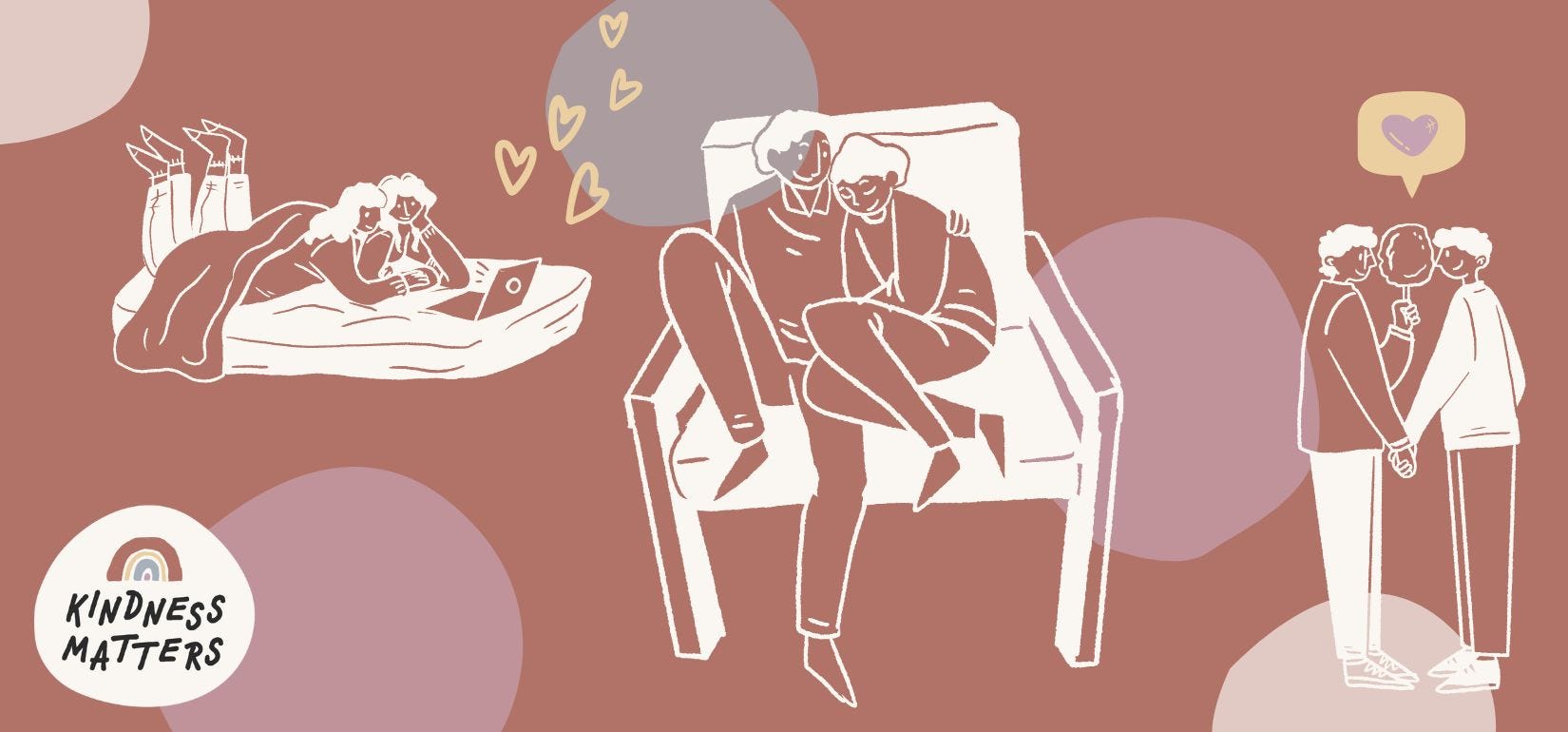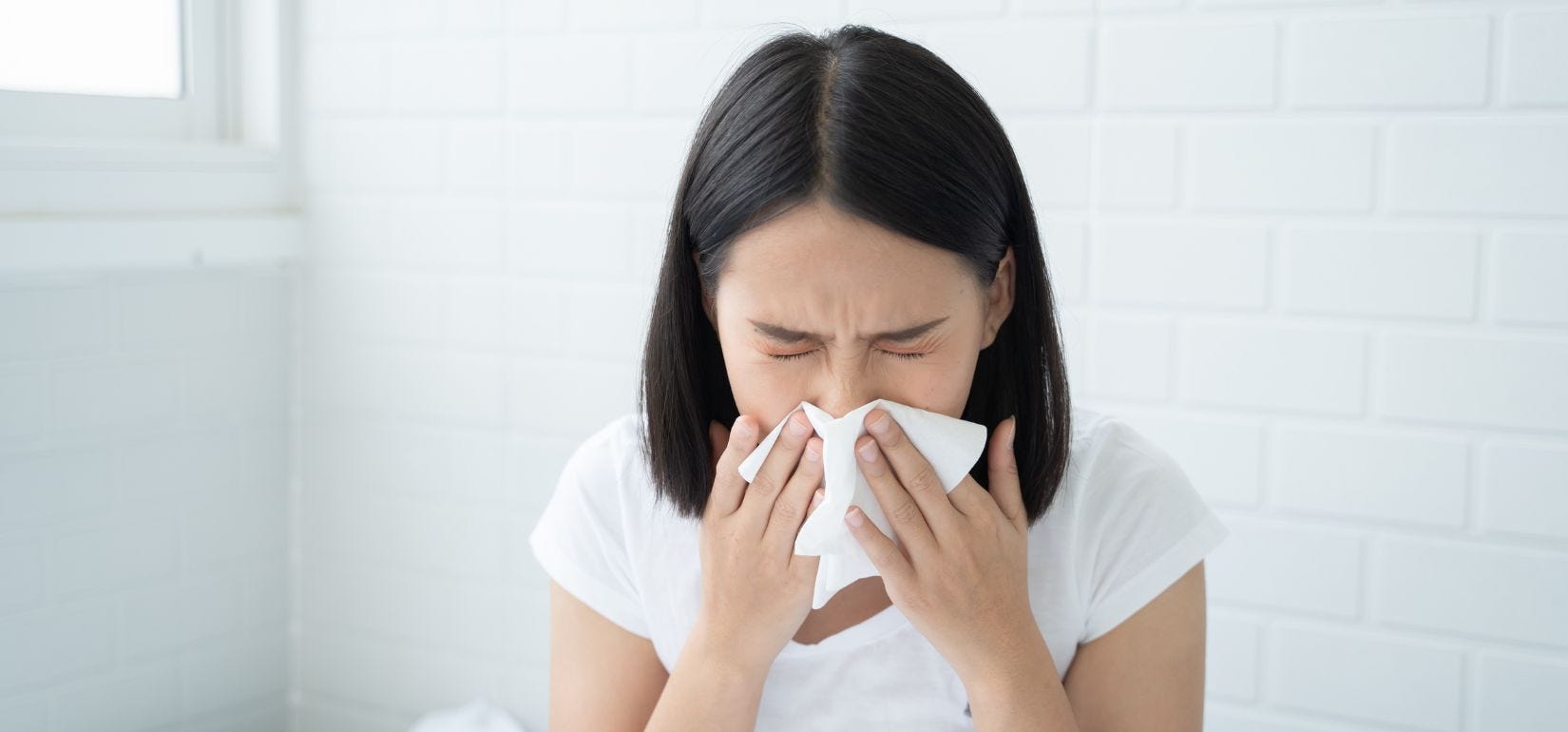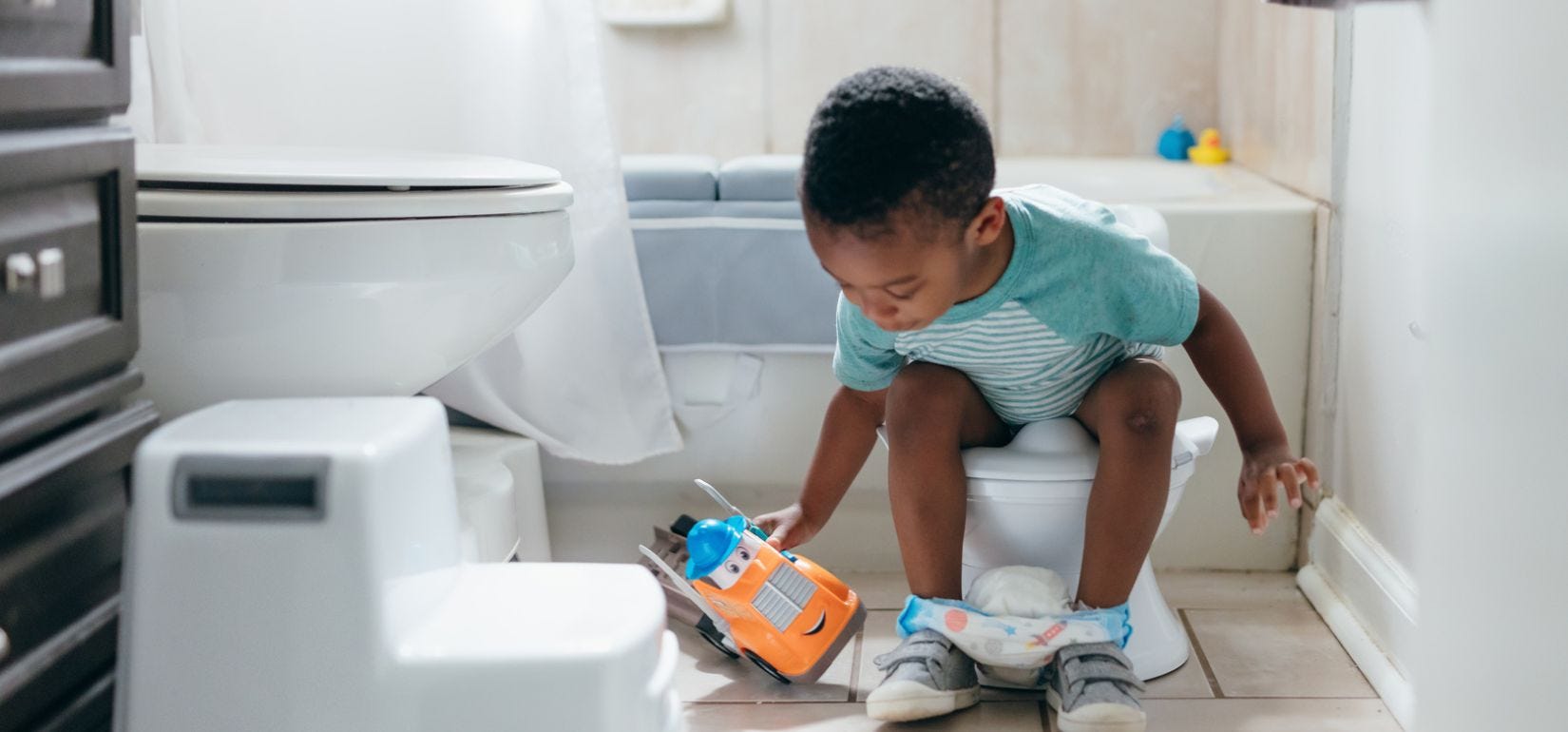Sex can sometimes be viewed as taboo, but let’s face it: It’s a regular part of our everyday lives, even if we’re not sexually active. It’s everywhere— on social media, television, and in advertisements.
But how is sex discussed among people who have autism? Do people who have autism receive the same type of sex education as people who are neurotypical (living without autism)? And most importantly, what kinds of impacts do these things have on people who have autism?
Check Your Eligibility
2 Easy Steps
Diapers and pull-ons for children ages 3+ with special needs, available through Medicaid.
What is Autism?
Autism spectrum disorder (ASD) is a neurodevelopmental condition that can cause developmental disorders. ASD can bring about social, cognitive, communicative, and behavioral challenges.
There is no single person affected by autism in the same way; Everyone has different levels at which their ASD affects their functionality as there are many other skills autism can affect. These impacts are called the “spectrum” in autism spectrum disorder.
For example, some people with autism can live an uninterrupted lifestyle. On the other hand, some people who have ASD may be significantly impacted by intellectual disabilities and communication differences. According to the Diagnostic and Statistical Manual of Mental Disorders 5 (DSM-5), people with these types of cognitive or language barriers may be diagnosed with Asperger's syndrome, one of the common diagnoses that fall under the ASD umbrella.
What Causes Autism?
The exact cause of autism is not known, but scientists and healthcare professionals believe it may be based on genetic and environmental factors.
What Are the Symptoms of ASD?
It is thought that with time, as some children with autism progress, their symptoms decrease in severity. While symptoms can vary from person to person, some common symptoms in adults include:
- Avoiding eye contact.
- Focusing intensely on different subjects or interests.
- Difficulty understanding what others are thinking or feeling.
- Being highly gifted in their cognitive abilities.
- Anxiety in social settings.
- Inability to understand sarcasm.
- Fear of breaking patterns or routines.
- Resembling symptoms of attention deficit hyperactivity disorder (ADHD).
- Inability to keep up with conversations.
- Communicating in tones irreflective of meaning or emotion.
- Problems following rules of social etiquette.
- Engaging in repetitive behaviors.
- Weak social skills.
- Having personal space issues, such as getting too close to others or disliking when others are close to them.
- Difficulty communicating emotions or feelings.
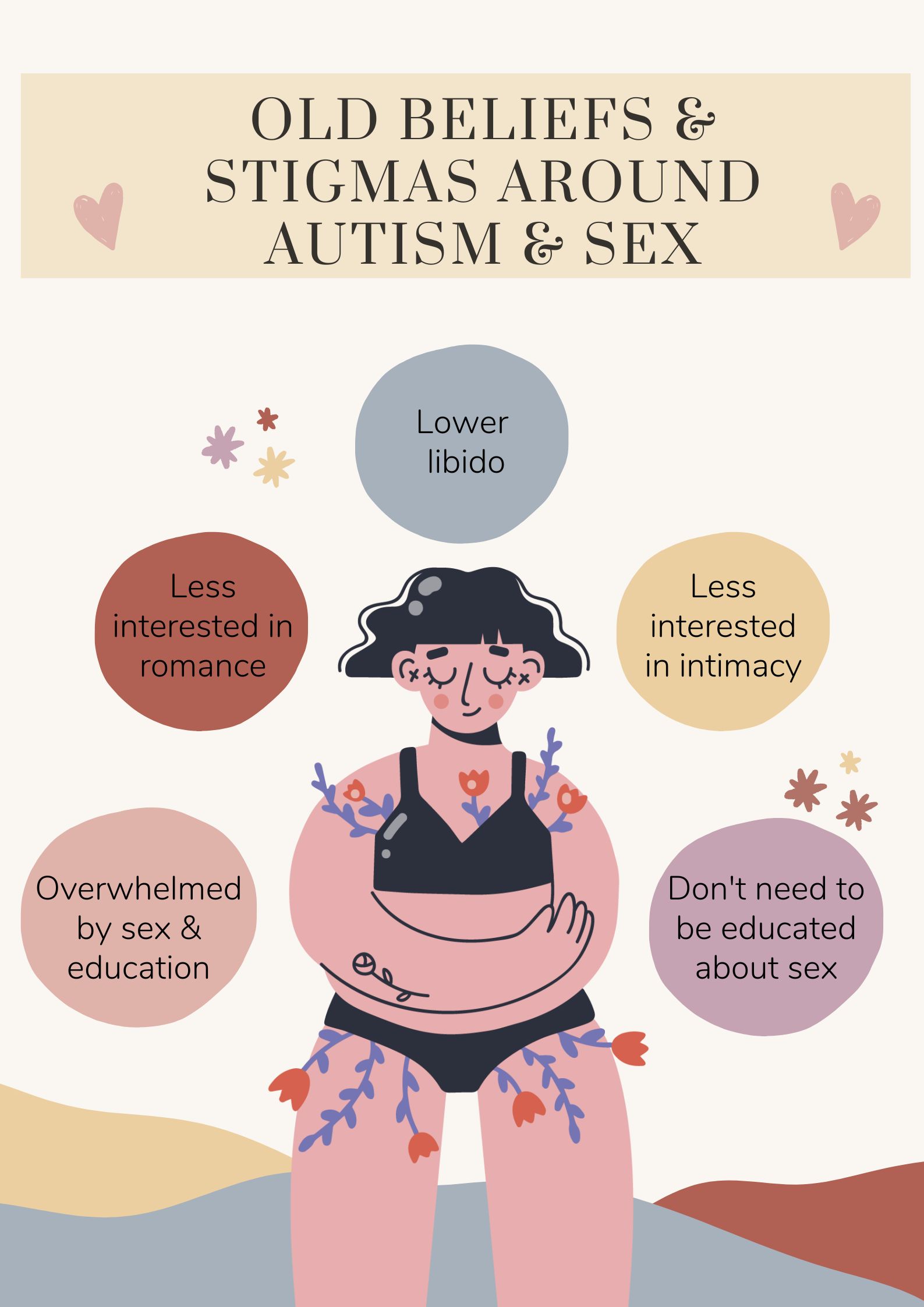

The Stigmas Surrounding Autism & Sex
Because people who have ASD may display some noticeable symptoms, such as communication and social interaction differences, neurotypical people frequently label adults and adolescents who have autism as having no sexual interest or thoughts. The United Kingdom’s TEACCH Report, which studies autism and sexual behaviors, lists five assumptions about autism and sex. Common assumptions are that people who have ASD:
- Have a lower libido.
- Are less interested in romantic relationships.
- Are less interested in intimate relationships.
- Are unable to comprehend or “handle” sexual education or engagement.
- Have less sexual interest overall.
- Should not be educated about sex.
While people who are not neurodivergent may come to these conclusions, studies show that a person who has ASD develops and maintains the same level of sexual interest as neurotypical people.
Autism & Sexual Development
We all go through the same sexual development. There’s the curiosity phase when you’re younger, the experimental phase consisting of sexual exploration and further curiosity as an adolescent, and finally, for some, the engagement phase where we begin having some type of sexual contact, having sex, and developing romantic and sexual relationships. Of course, this process is never the same for any one person— everyone has different sexual experiences at various times throughout their lives.
For adolescents who have autism, sexual development can be challenging to talk about. This may be because family members or caretakers have held onto the beliefs and stigmas around ASD and sex.
Some believe that adolescents who have autism shouldn’t or don’t need to be educated about sex or romantic relationships due to developmental challenges. But science shows this is not accurate. One study of 172 young adults (male and female) who had ASD found that:
- 77.9 percent expressed they wanted to be in a romantic relationship with a boyfriend or a girlfriend.
- 67.6 percent said they had been sexually attracted to someone at least once.
- 67.6 percent said they wanted to have sexual intercourse with another person.
- 60.3 percent said they wanted to be in a sexual relationship.


The main challenge adolescents who have autism face may be their lack of sexual knowledge simply because they aren’t given enough information from those around them. Sexual development is a crucial part of our sexual health, mental health, and the overall health of every person. It can affect our understanding of relationships, bodies, and internal wants and needs.
Autism & Gender Identity
Gender identity is a person’s internal sense of their gender. When you are assigned a gender at birth and continue to identify as that gender, you are considered cisgender. However, if you are given a gender at birth and choose to identify with a different gender, you may choose to be called transgender, gender fluid, or nonbinary.
In the United States, approximately one percent of the population identifies as nonbinary, transgender, or gender fluid. According to autism research, identifying with a sex different than the one assigned at birth is three to six times more common in people with ASD. The overlap between autism and gender identity shows that adults with autism are obviously in touch with their gender and sex.
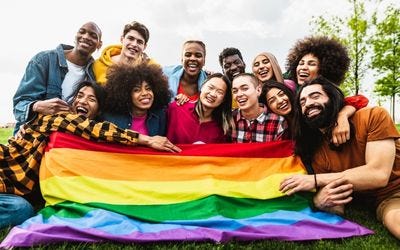

Autism & Sexual Orientation
When it comes to sexual orientation, studies show that identifying as LGBTQIA+ is common among people who have autism. Some may identify as homosexual, bisexual, or asexual. A survey of 2,400 people with autism found adults who had ASD were three to nine times more likely to identify as homosexual, asexual, or “other.” Women with autism were three times more likely to identify as homosexual, and men were three times more likely to identify as bisexual.
Some believe that this prevalence of LGBTQIA+ identification may be due to fewer social restrictions and pressures felt by people who have ASD. Without social anxieties, they are free to show their true selves more openly than people without a disability. These studies clearly show that people who have autism are well aware of their sexual selves and sexual desires.


Autism & Sexual Engagement
Intimacy is a meaningful way we as humans express ourselves and connect with others. People who have autism have the same intimate desires as everyone else. And, just like neurotypicals, adults with autism date, have romantic relationships, get married, and engage in sexual intercourse and sexual activity.
Clinician studies have found that men who have ASD have a strong desire for romantic relationships, and females have a high rate of engagement in relationships. Currently, there isn’t enough information to say just how many or what percent of adults who have autism engage in sexual intercourse, but there have been some findings in how sex can be different for people who have ASD:
- Sensory sensitivities. Some people who have autism are sensitive to stimuli that can affect their ability to have sex. Sensory processing disorder (SPD) is common among individuals with autism. Someone with SPD may be overloaded with sensory input from their five senses: Smell, sight, taste, touch, sound. A person who has ASD may also have issues with their interoceptive (internal) and proprioceptive (external) senses. This means that they may not be able to tell what sensations are happening inside or outside of the body.
- Communication roadblocks. If a person with autism has trouble with verbal or non-verbal communication, they may experience complications with their partner during sexual activity or in their relationships. This can also complicate the person’s ability to read what their partner is feeling or the physical cues they are giving.
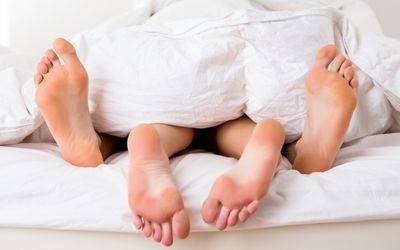

- Level of experience. Due to a lack of sexual education or information in adolescence, some adults who have ASD may experience a slower introduction to sexual relationships and sex. A person with autism may also lack physical, sexual experience due to late cognitive and intimate development.
- Incontinence. One study found that urinary incontinence was present in 82 percent of adults with autism. Incontinence can interrupt the daily lives of anyone, and sexual health is one of the ways your sex life can be put on hold at times. Some women find that if they are dealing with incontinence, it can interfere with sex by experiencing urge incontinence, or urinary leakage, during intercourse.
Risks of Autism & Sexual Engagement
While most aspects of having sex as a person with ASD are similar to sex for people who are not neurodivergent, some risks may occur alongside sexual engagement. These include:
- Sexual assault. According to the Justice Department’s unpublished federal crime data, people who have developmental disabilities experience sexual assault seven times more than people who do not have disabilities. It’s also reported that the attacker is commonly someone the person who is disabled knows. The victimization of a person with autism may occur because predators are more likely to target them because they may be prone to manipulation, or not be able to differentiate between what constitutes a “good” or “bad” touch. It may also be due to a lack of sexual knowledge.
*If you or a loved one is aware of sexual assault or has been assaulted, visit the National Sexual Assault telephone hotline website, or call directly at 800.656.HOPE (4673).
- Sexual abuse / offense. Just because someone has ASD does not mean that they are more likely to abuse someone sexually, but studies show a link between sexually abusive behaviors and autism. The reasons suggested for this behavior have been related to social difficulties, misunderstanding, sex and relationship deficits, and inadequate control. The most common type of sexual offense is public masturbation.
- Hypersexuality. Hypersexuality, also known as compulsive sexual behavior, is commonly a condition in men who have ASD. Hypersexuality is an addiction to sexual behaviors that causes a person to have sexual fantasies, urges or behaviors that can be challenging to control. This may occur because a person who has autism becomes over-stimulated to certain senses and engage in repetitive sexual behaviors.
- Excessive masturbation. This is common in men who have autism. It’s linked to a need for sexual activity (just as everyone else has this, but may not be met because of a lack of intimacy), repetitive behavior, and possible obsessive-compulsive disorders (OCD).
Each risk correlated with sexual engagement in people who have autism can be linked to a lack of sexual education, knowledge, discussion, and transparency. It’s essential that we help change this by destigmatizing the conversations around sex and autism, both in and out of the autistic community.
Destigmatizing Autism & Sex
In the first half of the 20th century, people with special needs were involuntarily sterilized to “cleanse” the general population of “undesirable” traits. Sterilization included vasectomies and hysterectomies among the special needs communities. For many years after, most healthcare providers, psychologists, and researchers still believed that a person with special needs would be unable to understand sexuality, much less wish to engage in sexual activity or romantic relationships. And according to a 2015 PubMed study, researchers are still discovering more about the sexual behaviors and desires of people who have ASD.
While it is unfortunate and sickening that people who are disabled were mistreated, we now know that people who have autism are capable of experiencing the entire spectrum of sexuality, just as people who are neurotypical do.
Many of the issues people who have ASD face regarding sexual behavior and activity can be traced back to those old beliefs and stigmas, so it’s clear that we need to have more resources available to the autistic and non-disabled communities.


Improving Sex Education
Besides educating yourself on how autism affects sex, you can advocate for more attainable sex education for younger people who have ASD. Sex education is crucial to any society’s success, health, and decency, and adolescents with autism need to be educated, just as adolescents who are neurotypical are.
The easiest way to educate everyone is to have open discussions with peers and family members about sex and sexual health. Talking openly about sex could decrease sexual abuse and assault rates among people with ASD, increase the ability to have and maintain romantic relationships, and reduce the occurrences of sex offenses by people who have autism.
People who have autism can also be supported in their sexual and romantic endeavors by receiving information about romantic relationships.
How Aeroflow Urology Can Help
If you or a loved one has autism, you may experience incontinence. We know how frustrating it can be to run out of incontinence supplies and spend finances on expensive products. That’s where Aeroflow Urology comes in! We assist in supplying incontinence supplies through your Medicaid (and some private insurance) plans.
How It Works
Want to see if you qualify for incontinence supplies through Aeroflow Urology? Simply fill out our eligibility form-- it’s quick and easy to do.
Then, our Continence Care Specialists take care of everything, finding you or your family the right products and supplies you need.
If approved, you’ll get incontinence supplies shipped directly to your home in discreet packaging each month.
We’ll also send you text messages or email reminders when it’s time to refill your supply, so you’ll never run out of incontinence supplies again.
Jul 03;, A. S. D. N. U. 2019, Gubbiotti, M., Balboni, G., Bini, V., Elisei, S., Bedetti, C., Marchiafava, M., MEDLINE®/PubMed®, A. G. F., & Medicine, a database of the U. S. N. L. of. (n.d.). Bladder and Bowel Dysfunction in Adults With Autism Spectrum Disorders. PracticeUpdate. Retrieved March 23, 2022, from https://www.practiceupdate.com/content/bladder-and-bowel-dysfunction-in-adults-with-autism-spectrum-disorders/86263
Kellaher, D. C. (2015). Sexual Behavior and Autism Spectrum Disorders: an Update and Discussion. Current Psychiatry Reports, 17(4). https://doi.org/10.1007/s11920-015-0562-4
Recognizing and Preventing Sexual Abuse. (n.d.). Autism Speaks. https://www.autismspeaks.org/recognizing-and-preventing-sexual-abuse
UK, A. I. (n.d.). Sexuality and Autism © TEACCH Report. Autism Independent UK. Retrieved March 22, 2022, from https://autismuk.com/autism/sexuality-and-autism/teacch-report/
Autism and Masking During Sex. (2020, November 11). NeuroClastic. https://neuroclastic.com/autism-and-having-sex-plus-sex-hacks-for-autistic-couples/
Schöttle, D., Briken, P., Tüscher, O., & Turner, D. (2017). Sexuality in autism: hypersexual and paraphilic behavior in women and men with high-functioning autism spectrum disorder. Dialogues in Clinical Neuroscience, 19(4), 381–393. https://www.ncbi.nlm.nih.gov/pmc/articles/PMC5789215/
Sexual Experiences in the Autism Spectrum Disorder Community. (2013). Nyu.edu. https://wp.nyu.edu/steinhardt-appsych_opus/sexuality-and-autism-spectrum-disorders/
Autism Speaks. (2013). Autism Diagnosis Criteria: DSM-5 | Autism Speaks. Autism Speaks. https://www.autismspeaks.org/autism-diagnosis-criteria-dsm-5
Sex on the Spectrum | Psychology Today. (n.d.). Www.psychologytoday.com. Retrieved March 22, 2022, from https://www.psychologytoday.com/us/blog/sex-in-the-brain/202007/sex-the-spectrum
Dattaro, L. (2020, September 14). Largest study to date confirms overlap between autism and gender diversity. Spectrum | Autism Research News. https://www.spectrumnews.org/news/largest-study-to-date-confirms-overlap-between-autism-and-gender-diversity/
Gender and sexuality in autism, explained. (2020, September 18). Spectrum | Autism Research News. https://www.spectrumnews.org/news/gender-and-sexuality-in-autism-explained/
Masterson, V. (2021, June 21). 6 charts that reveal global attitudes to LGBT+ and gender identities in 2021. World Economic Forum. https://www.weforum.org/agenda/2021/06/lgbt-gender-identity-ipsos-2021-survey/
| Autistic People More Likely to Identify as LGBTQ. (2020, June 22). SPARK for Autism. https://sparkforautism.org/discover_article/autism-lgbtq-identity/
Information provided on the Aeroflow Urology website is not intended as a substitute for medical advice or care from a healthcare professional. Aeroflow recommends consulting your healthcare provider if you are experiencing medical issues relating to incontinence.

